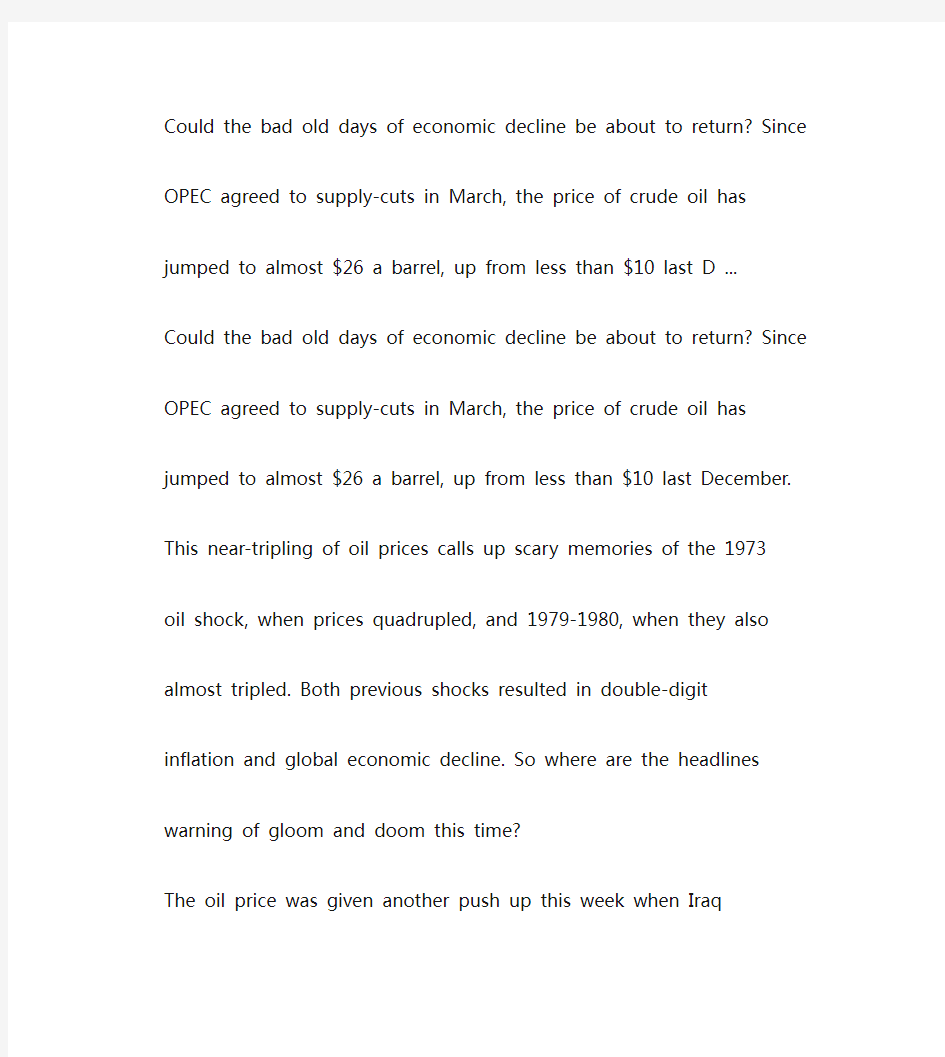考研英语真题阅读理解试题与名师解析十三

- 1、下载文档前请自行甄别文档内容的完整性,平台不提供额外的编辑、内容补充、找答案等附加服务。
- 2、"仅部分预览"的文档,不可在线预览部分如存在完整性等问题,可反馈申请退款(可完整预览的文档不适用该条件!)。
- 3、如文档侵犯您的权益,请联系客服反馈,我们会尽快为您处理(人工客服工作时间:9:00-18:30)。
Could the bad old days of economic decline be about to return? Since
OPEC agreed to supply-cuts in March, the price of crude oil has
jumped to almost $26 a barrel, up from less than $10 last D ...
Could the bad old days of economic decline be about to return? Since
OPEC agreed to supply-cuts in March, the price of crude oil has
jumped to almost $26 a barrel, up from less than $10 last December.
This near-tripling of oil prices calls up scary memories of the 1973
oil shock, when prices quadrupled, and 1979-1980, when they also
almost tripled. Both previous shocks resulted in double-digit
inflation and global economic decline. So where are the headlines
warning of gloom and doom this time?
The oil price was given another push up this week when Iraq
suspended oil exports. Strengthening economic growth, at the same
time as winter grips the northern hemisphere, could push the price
higher still in the short term。
Yet there are good reasons to expect the economic consequences now
to be less severe than in the 1970s. In most countries the cost of
crude oil now accounts for a smaller share of the price of petrol
than it did in the 1970s. In Europe, taxes account for up to four-
fifths of the retail price, so even quite big changes in the price of
crude have a more muted effect on pump prices than in the past。
Rich economies are also less dependent on oil than they were, and
so less sensitive to swings in the oil price. Energy conservation, a
shift to other fuels and a decline in the importance of heavy,
energy-intensive industries have reduced oil consumption. Software,
consultancy and mobile telephones use far less oil than steel or car
production. For each dollar of GDP (inconstant prices) rich economies
now use nearly 50% less oil than in 1973. The OECD estimates in its
latest Economic Outlook that, if oil prices averaged $22 a barrel for
a full year, compared with $13 in 1998, this would increase the oil
import bill in rich economies by only 0.25-0.5% of GDP. That is less
than one-quarter of the income loss in 1974 or 1980. On the other
hand, oil-importing emerging economies—to which heavy industry has
shifted—have become more energy-intensive, and so could be more
seriously squeezed。
One more reason not to lose sleep over the rise in oil prices is
that, unlike the rises in the 1970s, it has not occurred against the
background of general commodity-price inflation and global excess
demand. A sizable portion of the world is only just emerging from
economic decline. The Economist's commodity price index is broadly unchanging from a year ago. In 1973 commodity prices jumped by 70%
and in 1979 by almost 30%。
31. The main reason for the latest rise of oil price is
[A]global inflation. [B]reduction in supply。
[C]fast growth in economy. [D]Iraq's suspension of exports。
32. It can be inferred from the text that the retail price of
petrol will go up dramatically if
